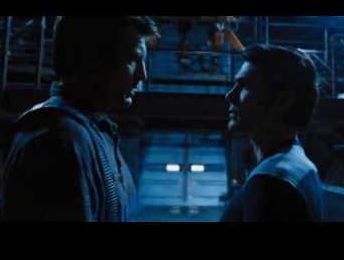
There have been a number of reviews for Pay Me, Bug! that have compared it to Firefly. I love those reviews, because a) Firefly is awesome, b) I wrote PMB! a year after Firefly’s painfully short-lived run (it came out in 2002, I wrote PMB! in 2003) and yes, the show did leave its mark on me so some comparison is apt, and c) Firefly did a lot of things, story-wise, that I want to do when I write—so being compared to it is a good sign.
(Though I should note that while I was writing PMB! I found myself more influenced by Farscape, and I specifically took inspiration for Grif and Amys’ relationship from an episode where John Crichton and Aeryn Sun impersonate bounty hunters and go by the names “Butch” and “Sundance.”)
There is one part of the comparison that fascinates me, which is when Grif gets compared to Malcom Reynolds. Superficially it’s a good fit: they’re both mavericks, they’re both smartasses, they’re both loyal to their crew, they’re both always getting into trouble. But I think the comparison can really be ONLY superficial. Fundamentally their characters are so different that I don’t think, at the end of the day, they would ever really get along.
The more I thought about this, the more I thought it would be fun to write about why I see it that way, and it mostly has to do with how I view Mal, who has become one of my favorite characters on television and, I think, is the proper heir to Han Solo’s Mantle of Scruffy Nerf-Herder Awesome. So without further ado, here are my Reasons Why Grif and Mal Aren’t the Same, and Why They Probably Wouldn’t Get Along.
Malcom Reynolds: Embittered, Damaged Idealist
The core, driving piece of Captain Reynolds’ character that makes him so interesting as a maverick space captain is that at his core, he’s an idealist—an idealist whose ideals have been so damaged he is constantly running away from them, telling himself he doesn’t care, trying to prove to himself he doesn’t care, and then ultimately caring. He can be cold-blooded, calculated, and unsympathetic in most cases, because he’s managed to build a shell around himself in order to survive, but once upon a time he was a committed revolutionary, a true believer, sustained by faith and ideology… only to be abandoned by the revolution he and his friends and comrades had sacrificed pretty much everything for. He hates the Union of Allied Planets, sure, but in the end he hates the leaders of the Browncoats more (at least, so I have always imagined) because after all the grunts went through, the Browncoat leaders gave up.
He named his ship Serenity in part because he couldn’t escape what the Battle of Serenity Valley did to him, and in part because he sees his chosen way of life as the only way he has left to continue, in some symbolic way, fighting that war.
Throughout the series, though, we continually see that Captain Reynolds can’t shake his moral center, no matter how much he wants to, even if it costs him greatly. The takes River and Simon on as crew, even though it puts his entire crew in peril, ultimately because he decides what Simon did was right and he respects that (though he doesn’t like Simon much and thinks River is more than a little disturbing). He does show signs of regretting that decision the crazier River gets—he’s not so idealistic he’ll throw practicality out the window—but that is his guiding principal. Also, in “The Train Job,” he earns the wrath of Adelei Niska by returning the medicine he took such pains to steal because he learns the shipment is being taken to miners who suffer from Bowden’s Malady… on the grounds that it’s the right the thing to do. He doesn’t mind stealing when there are no victims (or when the victims are powerful and corrupt) but his life of crime is continuously hampered by a strong moral core, even when he doesn’t want it to. Heck, he even saves Jayne Cobb’s life after learning Jayne tried to sell out Simon, simply because he detects something beyond fear when Jayne asks him not to tell the rest of the crew what he did.
Grif Vindh: Cheerfully Amoral Troublemaker
Grif is a much simpler, straightforward character. He’s a smuggler, has no strong feelings against piracy, and while he does have a few lines he won’t cross those lines are rather far away and easy to avoid He doesn’t particularly like the Empire of the Radiant Throne, an oppressive theocracy run by telepaths who believe they’re God’s chosen, but he also doesn’t particularly like the Alliance of Free Worlds, a comparatively benign republic, and he mostly doesn’t like them for the same reasons: both governments have laws that get in his way. He doesn’t exactly consider them morally equivalent—at the end of the day, if he had to choose, he’d side with the Alliance because they’re probably more reliable business partners—but the differences between the two become a lot more important after you get caught, and since he spends a lot of time making sure he doesn’t get caught, those differences aren’t as important to him as others might think.
(Also, his preferred base of operations are the Trade Baronies, which are business-fueled governments that would make Ayn Rand squeal with delight and pretty much everyone else squeal with terror. He’s definitely not committed to making the world a better place).
Grif is not a particularly moral man. He’s not not particularly evil, but he’s certainly not good, and it would be a stretch to even call him nice. He’s not cruel, he doesn’t specifically wish people harm, he doesn’t go out of his way to ruin people’s lives, but he’s also not above killing random guards when he figures out they’re going to take him someplace he doesn’t want to be, he’s not above robbing people blind, and he’ll do what he has to do to get out of a tough spot.
If Grif had been thrown into the same situations Mal had, he might have kept Simon and River on as crew, but he absolutely would have stolen the meds and delivered them to Niska. He would have felt a little bad for the miners, but if he hadn’t been willing to do something terrible he wouldn’t have offered to work for Niska in the first place. In fact, if Grif has any strongly developed ethics at all, it would probably be focused on how he does his business: if there are specific items he isn’t willing to smuggle (i.e. slaves) then he would tell a prospective customer up front that he doesn’t do that. If he agrees to a job, he does the job, though if he is press ganged into a job things get murkier. The important thing, though, is that he wouldn’t have tried to work for Niska to begin with. Mal actually interviewed for the job with Niska, because he wanted to capitalize on his reputation for being a man who did business… only to find, at the end of the day, that there were more important things than doing business. Grif wouldn’t sign up to do business with a crime lord, and especially not Niska—he’d consider being under a crazy man’s thumb a terrible business decision. That said, he would have nothing but criticism for Mal’s decision to give the meds and the money back. First, he would criticize Mal for not doing the job. If you take the job, you do the job, and that’s that. Second, he would criticize Mal for not keeping the money. If you’re going to renege on a business arrangement with a ridiculously dangerous nutjob, you should at least keep the money. At least.
Also… he would have kicked Jayne out the airlock and never looked back. Well, more specifically, he would have told Amys to do it, because she’d have a better shot at actually getting it done. He doesn’t tolerate mutiny on his ship.
(Grif, by the way, would never have been a Browncoat. He wouldn’t understand why anyone would want him to be one. His response to a potential Browncoat recruiter would be “hey, I don’t like the Union either. THAT’S WHY I BREAK THE LAW SO MUCH.”)
Malcom Reynolds: Broke Up With His Religion But It Won’t Stop Calling
Mal is a man who has lost his faith, but he hasn’t lost it to the point that he can never think about it again. You see the remnants of it, good and bad, in almost everything he does—his willingness to risk everything to do the right thing is an example of the good part of it. His contempt for Inara’s profession is an example of dark, unpleasant side of it. You see his commitment to his faith at the beginning of the pilot, when he is convinced the Browncoats will win because God is on their side, and you see also see that faith crushed when he realizes his own people—and apparently his God—have betrayed him. His initial hostility toward Shepherd Book isn’t the hostility of someone who’s not a believer and is tired of dealing with people who are, it’s the hostility borne of someone who was a believer and had that belief torn away from them in a sudden, excruciating manner.
Grif Vindh: “I guess I’m the only one that remains unaffiliated”
OK, that quote is taken from O Brother, Where Art Thou? but it fits. Grif has no particular interest in religion, other than being mightily inconvenienced by it when psychotic telepath fanatics and their Naval Officer flunkies are actively trying to kill him. Grif would be happy to discuss theology with someone at a bar, assuming he was in the mood for such a thing, and it would make no impact on him whatsoever. I’m not saying he’s shallow, I’m just saying that if his soul was a pool of water, you could see the bottom from the edge and you probably shouldn’t dive in head first.
Malcom Reynolds is the better man
If you had to choose an ally among the two of them, you want Mal. If Mal decides he’s on your side, he sticks with you, no matter how much he hates it. If he says he’s dealing with you in good faith, he is. He’s the one who said:
SIMON: I’m trying to put this as delicately as I can… How do I know you won’t kill me in my sleep?
MAL: You don’t know me, son, so let me explain this to you once: If I ever kill you, you’ll be awake. You’ll be facing me, and you’ll be armed.
Malcom is, underneath all his emotional problems and personal flaws, a stand-up guy and a hero.
Grif Vindh is just this guy, you know?
Grif is a character I love to write, but I don’t think he’s a guy I’d ever want to meet. Grif is loyal to his friends, sure, but he’d never think of me as someone who could be a friend, so any encounter with him would not end well for me.
If Mal is the idealist hidden under layers and layers of carefully arranged emotional scar tissue, Grif is Zaphod Breeblebox with one less head. His idea of a moral center (“amoral center? Yes, I have one of those”) is a place you go to buy collars if you’re trying to impersonate a priest.
Let’s look back at Mal’s quote above. Grif’s approach to such things would be quite different:
GRIF: I’m not going to shoot you. First, I’m a terrible shot. Second, I’m much more useful at distracting you, while—
(AMYS STEPS FROM BEHIND A WALL PANEL AND SHOOTS. BODY FALLS WITH A THUMP)
GRIF: (IRRITATED) What took you so long? I was almost out of things to say.
AMYS: I’m pretty sure that’s impossible.
END SCENE
(Hmm. Actually, I think I’m going to work that in somewhere… I’ll find a place for it!)
I don’t think they could ever get along
The difference between Grif and Mal is that while Mal has all the necessary material to be a successful criminal, at his core he’s a decent guy and he can’t stop being one for any length of time. He’s terribly wounded, and he thinks he wants to be amoral because that will make him a person who isn’t hurt by what hurts him, but at the end of the day he can’t be That Guy because what he really wants is for all the things he believes are right to win.
Grif, on the other hand, is That Guy, With Qualifiers. The bad things he’s willing to do, he’ll mostly do without feeling bad about them. He’s doesn’t spend a lot of time second-guessing himself. He’s loyal to his crew, like Mal is, but that loyalty doesn’t extend much farther than that—it probably includes, to an extent, his other criminal/independent trader friends, but that’s about it. And the thing is, at the end of the day, even though Mal tries to be That Guy, he doesn’t actually like That Guy very much. That Guy hurts people who don’t deserve it.


